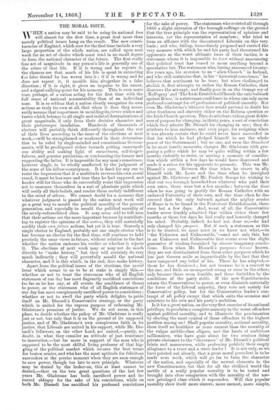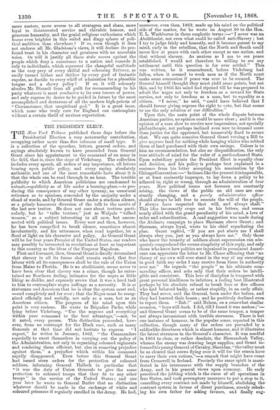THE MORAL ISSUE.
NkTHEN a nation may be said to be using its national free will almost for the first time, a great deal more than merely political issues hang on the result. The new consti- tuencies of England, which now for the first time include a very large proportion of the whole nation, are called upon next week for an act of choice which must tend in no small degree to form the national character of the future. The first really free act of magnitude in any person's life is generally one of the crises of that life. If it is wrong and he repents it, the chances are that much of his life is spent in extracting tie false thread he has woven into it ; if it is wrong and he does not repent it, it moulds him altogether in a false direction ; if it is right, it gives an impulse to his career, and a signal rallying-point for his memory. This is even more true, perhaps, of a nation acting for the first time with the full sense of national accountability than of an individual man. It is so seldom that a nation clearly recognizes its own actions as truly its own at all, that when it does they neces- sarily assume that importance in moulding itsfutere wishes and tastes which belongs to all single and isolated determinations of great magnitude, if only from their decisive character and
their picturesque insulation. Hundreds of thousands of electors will probably think differently throughout the rest of their lives according to the issue of the elections of next week,—will be strengthened or weakened in their determina- tion to be ruled by single-minded and conscientious Govern- ments, will be predisposed either towards petting unscrupul- ous ability and making light of earnestness, self-forget- fulness, and genuine patriotism, or condemning the former and supporting the latter. It is impossible for any man's conscience, however single, to be wholly unaffected by the judgment of the mass of his fellow-countrymen. It is hard for any one to resist the impression that if a multitude reverses his own moral creed, it must be less sure and true than he had supposed, and harder still for those who do successfully resist this impression not to ensconce themselves in a sort of pharisaic pride which will ossify all their beliefs, and render them unduly indifferent to the creed of others. We cannot doubt for a moment that whatever judgment is passed by the nation next week will go a great way to mould the political morality of the present generation, and especially to mould the political morality of the newly-enfranchised class. It may seem odd to tell men that their actions are the more important because by contribut- ing to register the opinions of the nation, they will materially modify their own future actions, but yet it is true. Scarcely a single elector in England, probably not one single elector who has become an elector for the first time, will continue to hold precisely the same views in future; without relation to the fact whether the nation endorses his verdict or whether it rejects it. The elections of next week may or may not do much directly to "make history," but they will certainly do very much indirectly ; they will powerfully mould the national character, and it is this which, in the end, does make history.
Apart from the political issues of the elections, the moral issue which seems to us to be at stake is simply this,— whether or not to trust the statesman who of all English statesmen of our day has most flagrantly sacrificed convictions (so far as he has any, at all events the semblance of them) to power, or the statesman who of all English statesmen of our day has most conspicuously sacrificed power to convictions ; whether or not to swell the party which delights to pride itself on Mr. Disraeli's Conservative strategy, or the party which is united for the express purpose of redeeming Mr. Gladstone's promises of justice. We do not mean, in this place, to decide whether the policy of Mr. Gladstone is really just or not, but only that it is on the ground of its supposed justice, and of Mr. Gladstone's own conspicuous faith in its justice, that Liberals are united in his support, while Mr. Dis- raeli's followers, on the other band, are united,—partly, no doubt, in what they consider an attitude of just resistance to innovation,—but far more in support of the man who is supposed to be the most skilful living professor of that hig- gling of the political market which secures the best terms for beaten armies, and who has the most aptitude for felicitous surrenders at the precise moment when they are soon enough to save power, though too late to save principle. Whatever may be denied by the looker-on, this at least cannot be denied,—that on the two great questions of the last few years Mr. Gladstone has both sacrificed power and in- curred obloquy for the sake of his convictions, while on both Mr. Disraeli has sacrificed his professed convictions
for the sake of power. The statesman who resisted all through 1866 a slight extension of the borough suffrage on the ground that the true principle was the representation of opinions and interests, not the representation of numbers ; who tried to form an alliance with the discontented Liberals on this very basis ; and who, failing, immediately proposed and carried the very measure with which he and his party had threatened his opponents as the worst ultimate issue of their tactics, is a statesman whom it is impossible to trust without announcing that political trust has ceased to mean anything beyond a speculative bet. The statesman who, having announced twenty- five years ago, his aversion to an " alien Church " in Ireland, and who still maintains that, in his " historical conscience," he believes that sentiment to be true; but when challenged to abolish it, first attempts to endow the Roman Catholics, then disavows the attempt, and finally goes in on the Orange cry of ‘NoPopery' and ' The Irish Established Church the only bulwark against Rome,' is a statesman confidence in whom can only mean profound contempt for all professions of political sincerity. Not even Mr. Gladstone's bitterest foes would pretend to doubt his utter frankness and sincerity either on the Reform question or the Irish Church question. They do attribute to him great fickle- ness of purpose for changing, in thirty years, a sort of conviction which they admire Mr. Disraeli for changing in one ; they do attribute to him rashness, and even pique, for resigning when it was already certain that he could never have succeeded in that for which he had pledged himself to use the whole power of the Government ; but no one, not even the Standard in its most frantic moments, charges Mr. Gladstone with pro- posing a policy which he may be quite willing within a few months violently to resist, or moving a measure of concilia- tion which within a few days he would have disavowed and made it a crime for his opponents to promote. This was Mr. Disraeli's case. Between the time when he strove to ally himself with Mr. Lowe and the time when he inveighed against Mr. Gladstone and Mr. Poulett Scrope for wishing to shut out any borough householders whatever who paid their own rates, there were but a few months ; between the time when he was going to gratify the Roman Catholics with an endowed University of their own, and the time when he dis- covered that the only bulwark against the mighty armies of Rome is to be found in the Protestant Establishment, there were but a few days. And, worst of all, the Conservative leader never frankly admitted that within either those few months or those few days he had really and honestly changed his mind. Probably, indeed, he had not done so,—he had only changed his purpose. But if such a statesman as this is to be trusted, we must trust in we know not what,—in " the Unknown and Unknowable,"—and not only this, but in an Unknown and Unknowable that scorns even the slight guarantee of wisdom furnished by sincere temporary convic- tions. Even when Mr. Disraeli's purposes Leconte known, they are not discriminated from these other purposes which he has just thrown aside as impracticable by the fact that they have conquered any belief of his. These he has adopted,— those he has dismissed ; but not because he is a convert to the one, and finds an unsuspected wrong or error in the other; only because those seem feasible, and these forbidden by the conditions of the party strife. If the new Constituencies return the Conservatives to power, or even diminish materially the force of the Liberal majority, they vote not mainly for Conservative policy, but for the Conservative leader's con- tempt of all policy except that which suits the occasion and ministers to his own and his party's ambition.
Is it for a great nation, on the very first exercise of its national privilege, to proclaim a complete amnesty to the worst offenders against political morality, and to illustrate the proclamation by electing the most cynical of those offenders to the highest position among us ? Shall popular morality, national morality, show itself no healthier or more earnest than the morality of the vulgar middle-class cliques, and the knots of ambitious millionaires, who have gone about for two sessions doing private obeisance to the "cleverness" of Mr. Disraeli's political feints and manoeuvres, while professing publicly their empty allegiance to a truer and a wiser leader ? It is not only, as we have pointed out already, that a great moral precedent is to be made next week, which will go far to form the character of the nation, and especially of the newest elements in the new Constituencies, but that for all the civilized world the
mettle of a really popular morality is to be tested and brought into close comparison with the morality of the nar-
row privileged class which it supersedes. Will this popular morality show itself more sincere, more earnest, more simple, more austere, more averse to all stratagem and sham, more loyal to disinterested service and chivalric honour, and generous humanity, and the genial religious enthusiasm which burns even brighter in this soiled and dingy sphere of poli- tical ambition than elsewhere ? If so, even though it does not endorse all Mr. Gladstone's views, it will declare its pro- found trust in his character and greatness with no uncertain voice. Or will it justify all those stale sneers against the people which deny a conscience to a nation and concede it only to individuals, which represent the changeful multitude as the easy prey of every skilful and scheming flatterer, as easily turned hither and thither by every gust of fantastic caprice, as ductile to every whiff of admiration for a plausible tongue and a showy policy ? If so, it will solemnly absolve Mr. Disraeli from all guilt for recommending to his party whatever is most conducive to its own tenure of power, and only express its desire to be guided in future by the most accomplished and dexterous of all the modern high-priests of " Circumstance, that unspiritual god." It is a great issue, which none who truly care for England can contemplate without a certain thrill of anxious expectation.



































 Previous page
Previous page